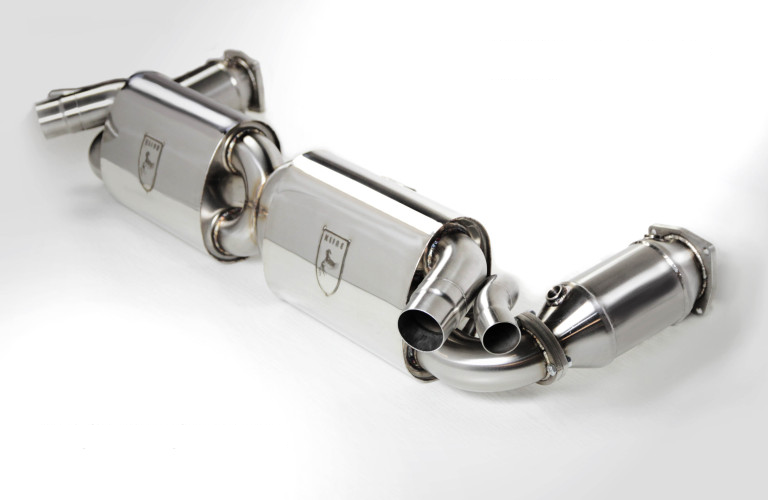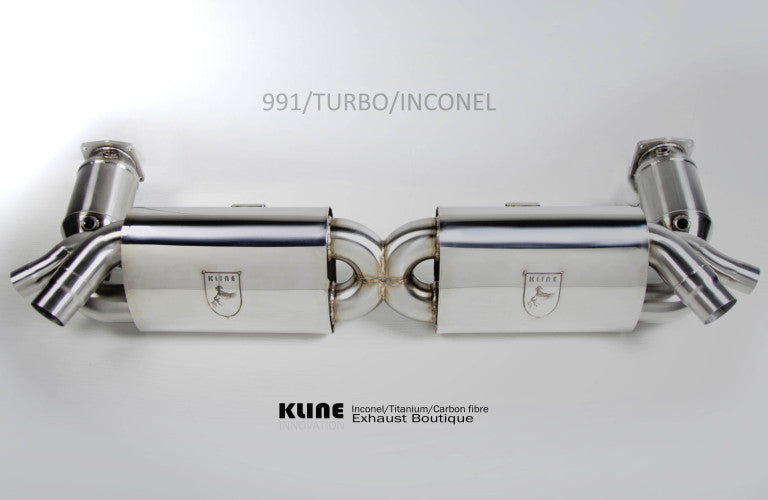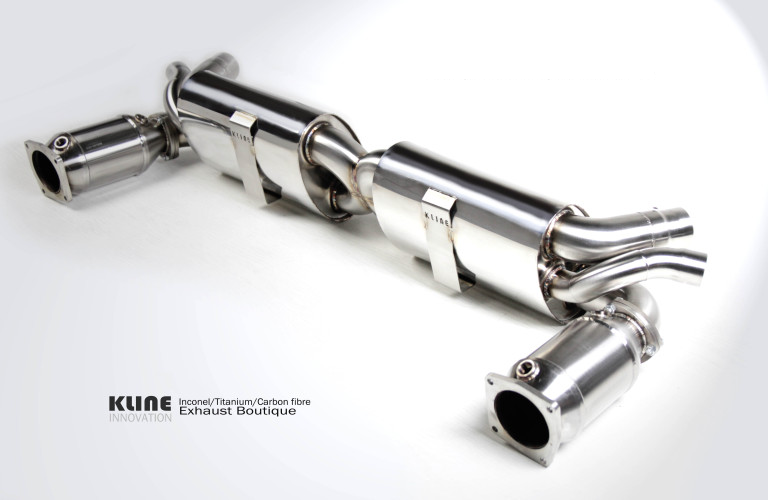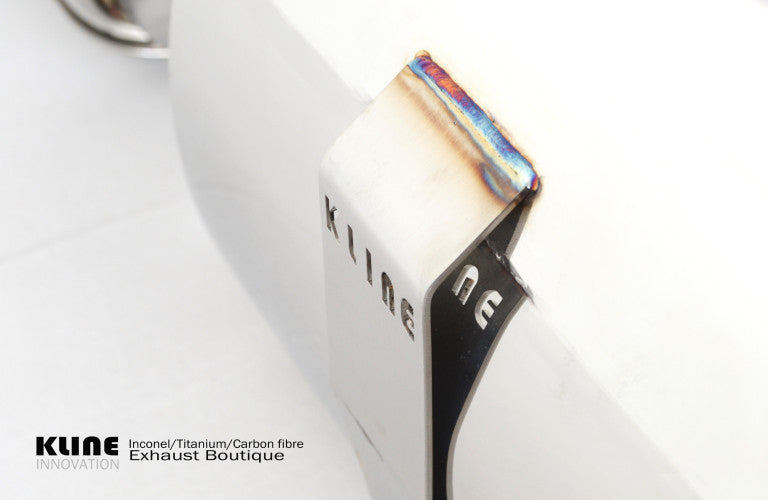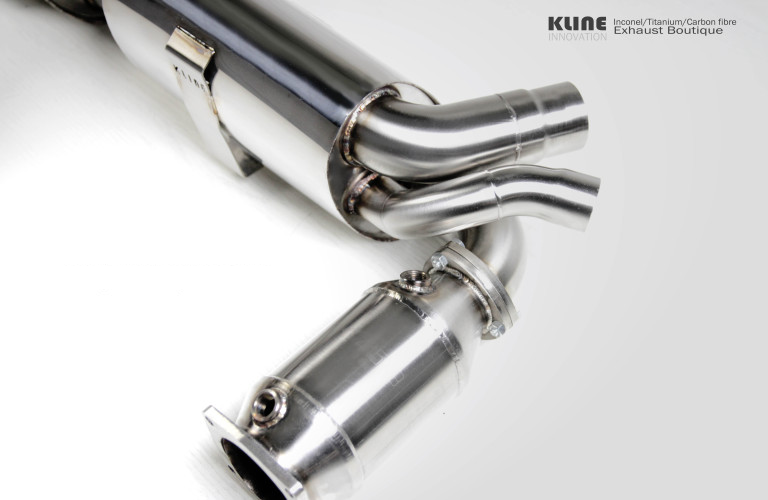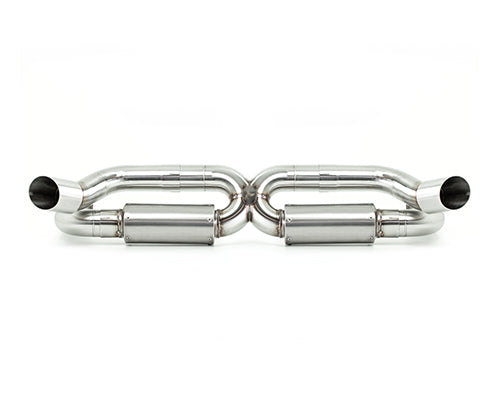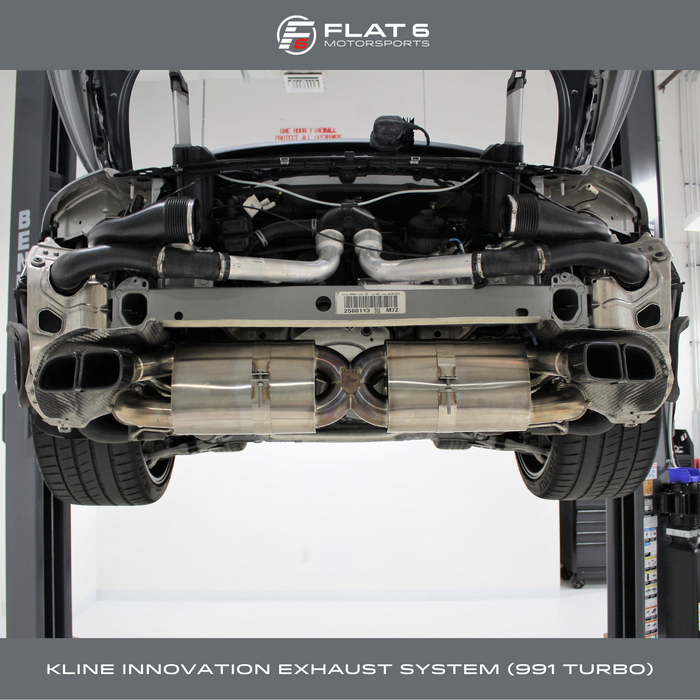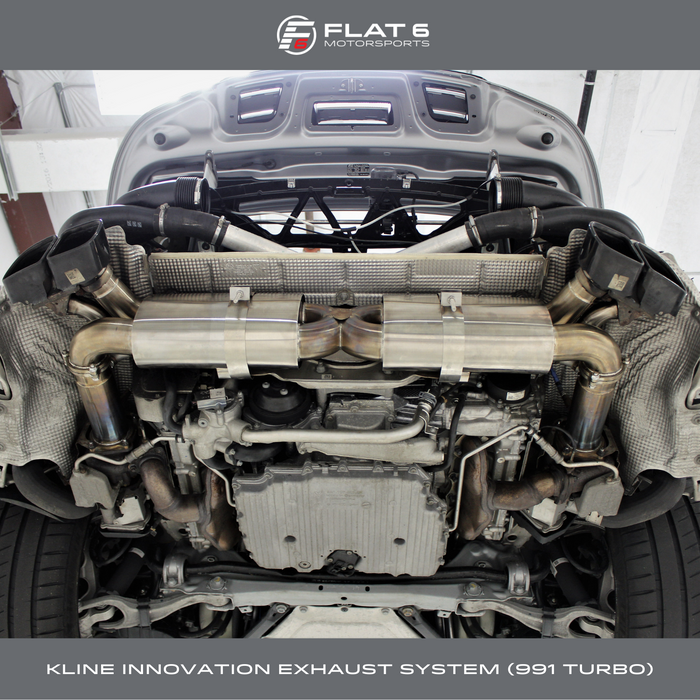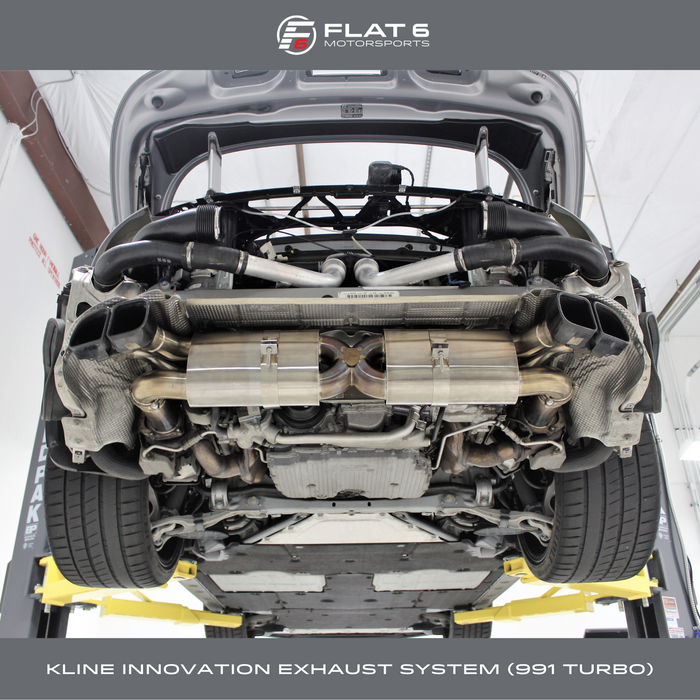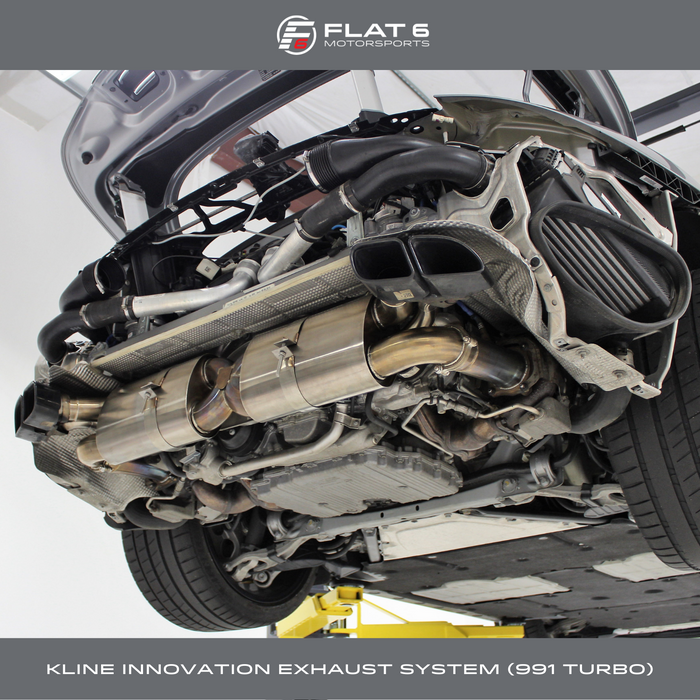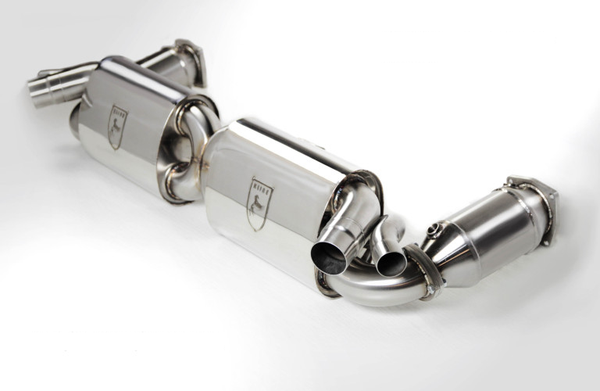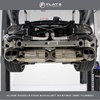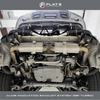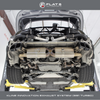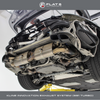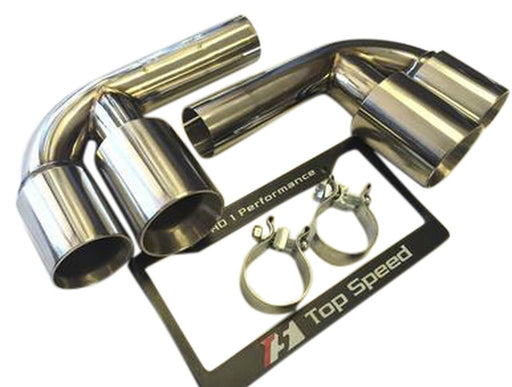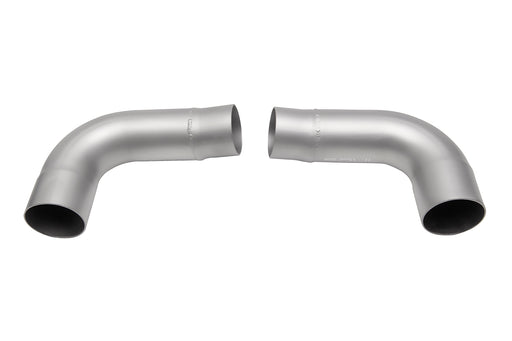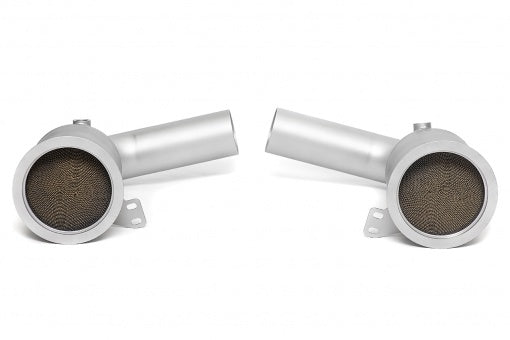Kline Innovation Exhaust System (991 Turbo)
Designed to fit
- 2013 - 2016 Porsche 911 Turbo / Turbo S (991.1)
- 2017 - 2019 Porsche 911 Turbo / Turbo S (991.2)
Note - The Race version uses GT2 style tips, the factory tips cannot be retained.
Product Details
Capitalizing on the design innovations and success of Kline’s 996 and 997 range, the bar for designing the Kline 991 turbo exhaust had been set high. Their trademark perfect x pipe geometry, harmonically tuned silencer geometry, Inconel 625, and their proprietary acoustic silencer packing materials result in a system that has become famous for that perfect sound. Zero drone, and a raised pitch raucous incendiary howl in higher rpms and hard throttle. The design is so perfect, that you can even run catless versions silently at cruising speeds, only unleashing that howl when you drive the car hard.
During development there were some clear evolutionary design steps that we could incorporate. The secondary tail pipe allowed us to integrate an effective gas overflow system. The concept was conceived at the fluid dynamic modelling stage, and effectively works to cut low rpm noise, while allowing an effective increased cross section at higher rpms producing a more accentuated Jekyll and hyde personality, and slightly broader torque curves. For a similar system, check out the iPE F1 exhaust.
Performance
Preliminary testing indicates a maximum power gain for the decat variant in the region from 35-45whp and 55-65nm torque.
Specs
Cross Section
- De-cat cross section 70mm OD specifically chosen for a balance of peak torque and power
- Silencer section, cross section 65mm OD and 44mm OD overflow
- Catalysts come in a 108mm OD to 127mm OD
Materials
Standard 304 grade Stainless Steel
Weight
- Decat - 12.5kg
- 100 Cell - 14kg
Inconel 625, formula one grade exhaust material
Weight
- System 7.5kg
BUILD TIME
304 STAINLESS
- Total - 14 hours
INCONEL 625
- Total - 30 hours
Video
About Kline Innovation

Kline Innovation is a Bucharest, Romania based exotic exhaust manufacturer who utilizes exotic materials to innovate high-end systems for Porsche, Ferrari, Lamborghini, Aston Martin, Audi, Bentley and McLaren. At Kline they take exhaust design very seriously. Consumers demand a no compromise product, and they take a no compromise approach to design and manufacture.
MATERIALS
At Kline Innovation they believe in the absolute best materials for every application, chosen scientifically by the materials natural properties. Titanium/Inconel/Carbon fiber exhaust boutique, they also offer 304 stainless steel as an alternative on their complete range. Every material has its own unique properties, and perfect application based on weight, strength, heat resistance, and chemical stability. Kline strives to craft some of the world’s best lightweight exhausts utilizing every innovation possible!
The following is a brief overview and explanation of the different materials they use, properties, and functions.
INCONEL
Inconel 625 is used in the aerospace industry where extremely durable and heat withstanding components are required. As an example, Inconel is used for the exhaust turbine blades in high performance jet engines. Inconel is used for the manufacture of formula one exhausts, and has also been used by some manufacturers on hypercar projects such as the Mcalren P1, Aston Martin 177, where lightness is a factor, and exhaust temperatures regularly exceed 1800 degrees fahrenheit.
The basic properties of Inconel are characterized by extremely high tensile strength, and extreme thermos-chemical stability. Due to the high tensile strength of Inconel (roughly the same strength to weight ratio as titanium), very thin sidewall material can be used, while still maintaining structural integrity, resulting in very light weight components that will not fatigue over time. The main drawbacks to using Inconel, is that it’s extremely difficult to machine and weld, and requires a high degree of skill and involves a time consuming processes. It’s also extremely expensive as a raw material.
TITANIUM
Titanium in its varying grades is commonly used in a variety of applications where strength to weight ratio is paramount. Very high tensile strength and low density mean that very light and strong components can be manufactured easily. Titanium is also relatively easy to machine and weld using standard engineering approaches. The main disadvantages to titanium, is the cost of material, and prolonged heat exposure exceeding 1100 degrees fahrenheit causes oxidation of the material, resulting in brittle components and potential breakages. For this reason titanium is best suited to cooler applications where strength and lightness is a factor.
STAINLESS 304
Stainless steel 304 grade has become the industry standard for exhaust manufacturing. It’s moderate strength, thermos-chemical stability, inexpensive, and easy to manufacture. 304 stainless can be used to build relatively inexpensive exhausts to a high standard of functionality and durability. The main drawback to stainless steel is the weight. Roughly the same density of steel, but reduced tensile strength, building high performance exhaust components from stainless can be limited. Also from the perspective of sound, the thick sidewall required from stainless, can produce a slightly dull lackluster sounding exhaust note when compared to the previously mentioned materials!
CARBON FIBER
Carbon fiber reinforced polymer has an extremely high tensile strength to weight ratio, surpassing that of all metals. Extremely light weight components can be molded to almost any shape. The main drawback to carbon fiber being, the material cost, the fatigue endurance limit is hard to define (the material can break unexpectedly), and the lack of prolonged heat resistance due to the polymer binding agent.

